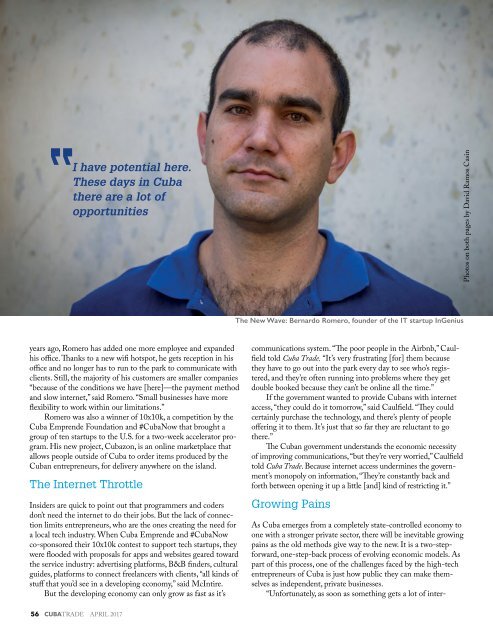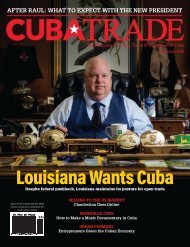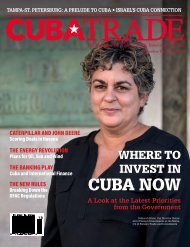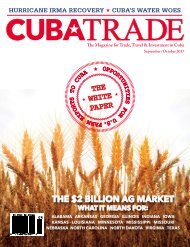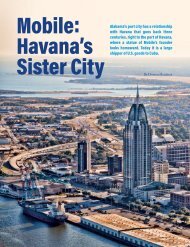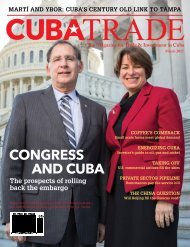CubaTrade-April2017-FLIPBOOK
Create successful ePaper yourself
Turn your PDF publications into a flip-book with our unique Google optimized e-Paper software.
I have potential here.<br />
These days in Cuba<br />
there are a lot of<br />
opportunities<br />
Photos on both pages by David Ramos Casin<br />
The New Wave: Bernardo Romero, founder of the IT startup InGenius<br />
Startup: The InGenius workshop in Havana<br />
years ago, Romero has added one more employee and expanded<br />
his office. Thanks to a new wifi hotspot, he gets reception in his<br />
office and no longer has to run to the park to communicate with<br />
clients. Still, the majority of his customers are smaller companies<br />
“because of the conditions we have [here]—the payment method<br />
and slow internet,” said Romero. “Small businesses have more<br />
flexibility to work within our limitations.”<br />
Romero was also a winner of 10x10k, a competition by the<br />
Cuba Emprende Foundation and #CubaNow that brought a<br />
group of ten startups to the U.S. for a two-week accelerator program.<br />
His new project, Cubazon, is an online marketplace that<br />
allows people outside of Cuba to order items produced by the<br />
Cuban entrepreneurs, for delivery anywhere on the island.<br />
The Internet Throttle<br />
Insiders are quick to point out that programmers and coders<br />
don’t need the internet to do their jobs. But the lack of connection<br />
limits entrepreneurs, who are the ones creating the need for<br />
a local tech industry. When Cuba Emprende and #CubaNow<br />
co-sponsored their 10x10k contest to support tech startups, they<br />
were flooded with proposals for apps and websites geared toward<br />
the service industry: advertising platforms, B&B finders, cultural<br />
guides, platforms to connect freelancers with clients, “all kinds of<br />
stuff that you’d see in a developing economy,” said McIntire.<br />
But the developing economy can only grow as fast as it’s<br />
communications system. “The poor people in the Airbnb,” Caulfield<br />
told Cuba Trade. “It’s very frustrating [for] them because<br />
they have to go out into the park every day to see who’s registered,<br />
and they’re often running into problems where they get<br />
double booked because they can’t be online all the time.”<br />
If the government wanted to provide Cubans with internet<br />
access, “they could do it tomorrow,” said Caulfield. “They could<br />
certainly purchase the technology, and there’s plenty of people<br />
offering it to them. It’s just that so far they are reluctant to go<br />
there.”<br />
The Cuban government understands the economic necessity<br />
of improving communications, “but they’re very worried,” Caulfield<br />
told Cuba Trade. Because internet access undermines the government’s<br />
monopoly on information, “They’re constantly back and<br />
forth between opening it up a little [and] kind of restricting it.”<br />
Growing Pains<br />
As Cuba emerges from a completely state-controlled economy to<br />
one with a stronger private sector, there will be inevitable growing<br />
pains as the old methods give way to the new. It is a two-stepforward,<br />
one-step-back process of evolving economic models. As<br />
part of this process, one of the challenges faced by the high-tech<br />
entrepreneurs of Cuba is just how public they can make themselves<br />
as independent, private businesses.<br />
“Unfortunately, as soon as something gets a lot of international<br />
publicity, that the government is not running itself, it<br />
causes problems,” Caulfield told Cuba Trade. “This is just part of<br />
the reality of living in Cuba.”<br />
If the government wanted to provide<br />
Cubans with internet access, “they<br />
could do it tomorrow<br />
John Caulfield, co-founder, Innovadores Foundation<br />
Last August, for example, a much-anticipated startup weekend<br />
organized by the Merchise Startup Circle was shut down a<br />
day before the event, all of the hotels suddenly claiming “technical<br />
problems.” Earlier that spring Stripe Atlas, a U.S. firm that<br />
helps internet businesses get started, announced it was partnering<br />
with Merchise to help Cuban entrepreneurs gain access to bank<br />
accounts and accept payments from all over the world.<br />
The deal gained considerable international attention, and<br />
President Obama even mentioned Merchise during a speech<br />
in Havana. But following this burst of international attention,<br />
Merchise was erased from Cuban media.<br />
On the other hand, Cuba’s underground railroad of digital<br />
entertainment—El Paquete (the packet), a collection of video and<br />
music transferred by flash drives—has for years been distributed<br />
across the island without government interference. At last year’s<br />
eMerge technology conference in Miami, one of the Paquete’s<br />
founders said this tolerance was based on the absence of anything<br />
political in the content.<br />
It’s not certain what this means for young entrepreneurs<br />
who are learning how to brand themselves, or for the new waves<br />
of students graduating from such academic powerhouses as the<br />
Universidad Tecnológica de la Habana José Antonio Echeverría,<br />
named after the famed student leader who died during the<br />
Revolution.<br />
“Most of the entrepreneurs that we work with are the ones<br />
that are willing to be a little more public in what they’re doing,”<br />
Matusky said of the Innovadores interns. “So a lot of them are<br />
kind of developing apps, are developing websites, and are deliberately<br />
generating press and generating a little bit of attention.”<br />
It’s a “much riskier proposition,” said Matusky, as opposed<br />
to working under the table in the grey market—but it is happening.<br />
“I’m seeing guys that were doing just the independent<br />
software development, and now they’re seeing that other people<br />
are being successful trying to make apps, and they’re able to talk<br />
about it, the government isn’t shutting them down. And so I<br />
think that now people are starting to take a little bit more risk<br />
and try new things.”<br />
So far the mission of the Innovadores Foundation, which is<br />
to foster onshore businesses and create a reason for talented graduates<br />
to stay in Cuba, seems well aligned with the interests of the<br />
government. “That’s why I think we’ve been allowed to operate<br />
as we are,” said Matusky, “and why we’re still hopeful about our<br />
program and our internship.” H<br />
56 CUBATRADE APRIL 2017<br />
APRIL 2017 CUBATRADE<br />
57


